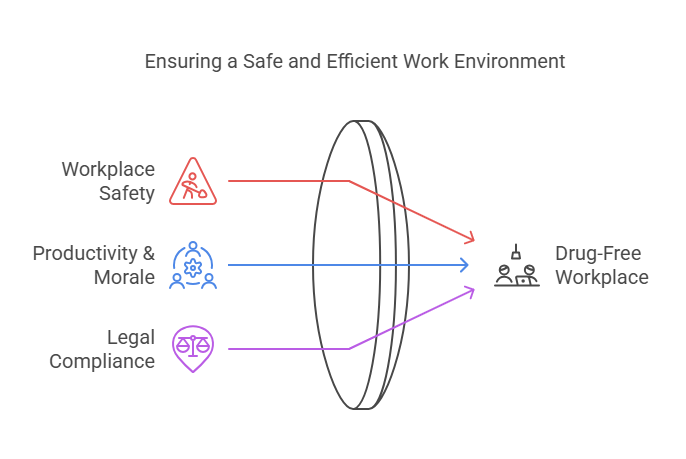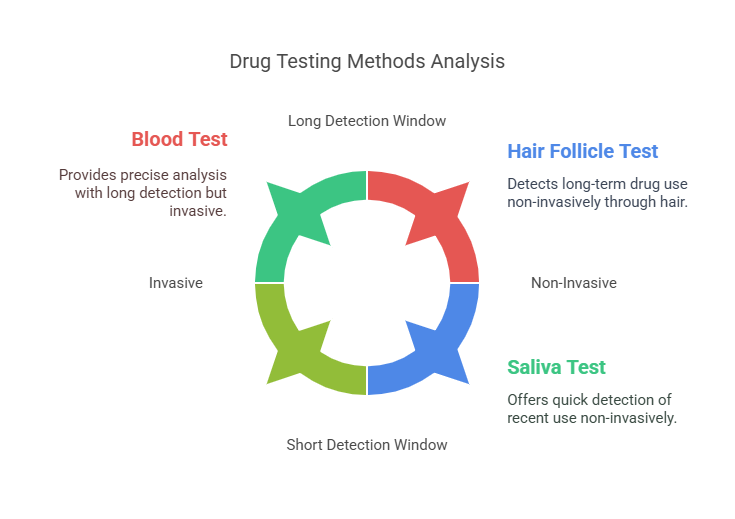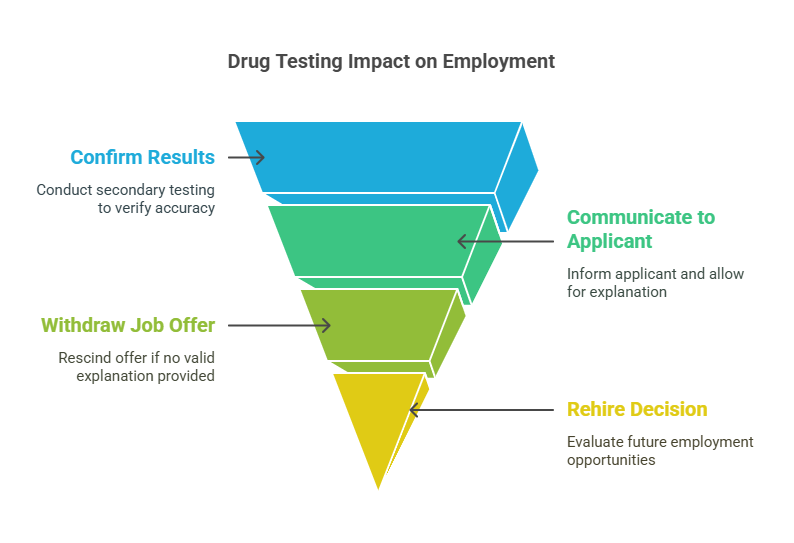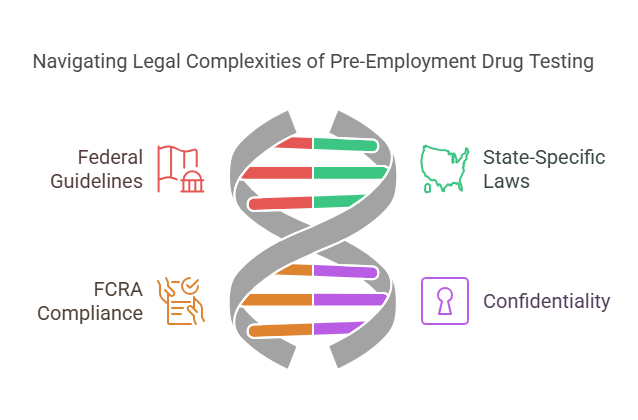The Impact of Drug Testing on Employment Decisions

Applicants Who Test Positive for Illegal Drug Use Can Be Screened Out of a Job Immediately
Defining Pre-Employment Drug Testing and Its Importance in Hiring
Pre-employment drug testing has become a standard procedure in many industries as employers seek to ensure the safety, productivity, and well-being of their workforce. This testing is conducted before an applicant is officially hired and typically forms part of the final steps in the hiring process. The primary goal of pre-employment drug screening is to assess whether an applicant is using illegal substances that could potentially impact their performance, behavior, or safety on the job.
The importance of drug testing in the hiring process cannot be overstated. Employers are not only protecting their company’s assets and ensuring a productive workforce, but they are also taking proactive steps to reduce potential risks related to workplace accidents, injuries, and conflicts. Drug use can impair an individual’s ability to perform tasks effectively, which in turn can affect overall team morale and workplace dynamics.
Why Employers Screen Out Applicants Who Test Positive for Illegal Drugs

- Workplace Safety: One of the primary reasons employers screen out applicants who test positive for illegal drug use is to maintain a safe working environment. Employees under the influence of drugs may be more prone to accidents, errors, and lapses in judgment. In high-risk industries like construction, transportation, and manufacturing, even a small mistake could lead to severe consequences, including workplace injuries or fatalities.
- Productivity and Team Morale: Employees who use illegal drugs may experience reduced concentration, motivation, and efficiency. A workforce that includes individuals with impaired judgment can also negatively affect the productivity of the entire team. This, in turn, can lead to increased absenteeism, poor performance, and strained working relationships. For employers, hiring individuals who do not use illegal substances helps ensure that the entire team is operating at peak performance.
- Legal and Industry Compliance: In some industries, drug testing is a legal requirement. For example, in sectors like transportation, healthcare, and federal employment, employers must adhere to strict drug testing guidelines to ensure compliance with federal regulations. Employers who do not conduct pre-employment drug testing may face fines, lawsuits, or even lose their licenses to operate. Additionally, some states have enacted laws mandating drug-free workplaces, making drug testing a necessary measure to avoid potential legal liabilities.
Types of Drug Tests Commonly Used

There are several methods for drug testing that employers use, each with its own advantages and limitations. The most commonly used drug tests include:
- Urine Test: The most common and widely accepted method of drug testing. It is inexpensive and relatively easy to administer. Urine tests can detect a wide range of substances, including marijuana, cocaine, opioids, and amphetamines. The detection window for urine tests typically ranges from a few days to a week, depending on the substance.
- Saliva Test: Saliva tests are less invasive than urine tests and can detect recent drug use, often within a few hours of consumption. These tests are typically used to screen for drugs like marijuana, cocaine, and opioids. The detection window is generally shorter than that of urine tests, usually 1-2 days.
- Hair Follicle Test: Hair tests have a longer detection window compared to other testing methods, often detecting drug use for up to 90 days. They can identify a variety of drugs, including marijuana, cocaine, and methamphetamines. However, hair tests tend to be more expensive and may not be as effective at detecting recent drug use.
- Blood Test: Although less common in pre-employment screenings due to its invasive nature, blood tests can be used to detect recent drug use. They are highly accurate but typically only used in situations where a more precise analysis is needed.
Commonly Tested Substances and Their Detection Windows
Below is a list of commonly tested substances and their typical detection windows:
| Substance | Detection Window | Common Test Types |
|---|---|---|
| Marijuana | 1-30 days (depending on usage) | Urine, Saliva, Hair |
| Cocaine | 2-4 days | Urine, Saliva, Hair |
| Opiates | 2-4 days | Urine, Saliva, Hair |
| Amphetamines | 1-3 days | Urine, Saliva, Hair |
| Methamphetamine | 3-5 days | Urine, Saliva, Hair |
| PCP | 2-8 days | Urine, Saliva, Hair |
Industries Where Drug Testing is Most Prevalent
Certain industries are more likely to implement pre-employment drug testing due to the nature of the work, safety concerns, and regulatory requirements. These industries include:
- Transportation: For safety reasons, the transportation industry often requires drug testing for truck drivers, pilots, and other transportation workers. The Department of Transportation (DOT) mandates regular drug testing for individuals operating commercial vehicles.
- Healthcare: Healthcare employers conduct drug tests to ensure the safety of patients and maintain a drug-free environment. Healthcare professionals, particularly those in critical care or direct patient contact roles, must adhere to strict drug-free policies.
- Federal Employment: Federal government agencies often require drug testing as part of their hiring process. This includes law enforcement positions, security roles, and positions requiring security clearance.
- Construction and Manufacturing: These industries involve high-risk activities that could lead to accidents if employees are under the influence of drugs or alcohol. Drug testing helps ensure safety in physically demanding and hazardous environments.
- Energy and Utilities: Similar to construction and manufacturing, employees in the energy sector, particularly those working in nuclear, electrical, and gas fields, must be drug-free to avoid serious accidents and injuries.
How Drug Testing Results Impact Employment Decisions

Steps Employers Take After Receiving Positive Drug Test Results
When an applicant tests positive for illegal drug use during pre-employment screening, employers must follow a well-defined process to ensure fairness, accuracy, and compliance with company policies and legal requirements. Here’s an outline of the steps typically taken:
- Confirmation of the Results: Positive drug test results are not automatically considered final. Employers usually confirm the results to ensure they are accurate. This may involve a secondary testing procedure, such as a confirmation test using a different method (e.g., a hair follicle test following a urine test). In many cases, a Medical Review Officer (MRO) will evaluate the test results. The MRO is a licensed physician who ensures that the test results are interpreted correctly and that there are no medical reasons (e.g., prescription medications) that could explain the positive result.
- Communicating the Outcome to the Applicant: Once the confirmation process is complete, the employer will notify the applicant of the test results. If the test is positive, the applicant will be informed and given the opportunity to explain the result. This is particularly important in situations where the applicant may have been using prescription medication or medical marijuana legally, as some states have exceptions for these substances.
- Withdrawal of Job Offers: If the positive test result stands and no valid explanation or exemption is provided, the employer may withdraw the job offer. Many employers include a clause in their offer letters or employment contracts indicating that the job offer is contingent upon passing a drug test. If the applicant fails the drug test, the offer can be rescinded immediately.
- Impact on Rehire or Future Employment: Some employers may allow applicants to reapply after a certain period if they fail a drug test, while others may have a strict policy of not rehiring individuals who fail the test. The decision often depends on the company’s drug-free workplace policies and the severity of the failure.
How Drug Use Policies Vary by Company, State, and Industry
Drug use policies are not uniform across all employers. Several factors influence how drug testing results are handled:
- Company Policies: Companies often establish their own drug testing policies, which can range from zero tolerance (immediate disqualification for any positive test) to more lenient approaches, such as offering counseling or rehabilitation programs for employees who test positive. Employers should clearly communicate their policies in employee handbooks or during the hiring process to avoid confusion.
- State Laws: State laws play a crucial role in determining whether an applicant can be screened out for testing positive for certain substances. For instance, some states have legalized medical or recreational marijuana, which means that employers in those states may be prohibited from taking adverse action solely based on a marijuana test result. However, in states where marijuana remains illegal, applicants who test positive for marijuana may be disqualified.
- Industry Regulations: In regulated industries like healthcare, transportation, and federal employment, drug testing is not only a company decision but also a legal requirement. Federal regulations, such as those from the Department of Transportation (DOT), enforce strict guidelines for drug testing in specific roles. Employers in these industries must follow these regulations and may be required to report positive drug test results to government agencies.
Potential Exceptions: Medical Marijuana and Legally Prescribed Medications
In certain cases, an applicant may test positive for substances that are legally prescribed or permitted under state laws. For instance, medical marijuana use is legal in many states, but it may still result in a failed drug test. The key challenge for employers is balancing state laws with their drug-free workplace policies. Some employers may choose to provide exceptions for medical marijuana users or applicants using legally prescribed medications, but this varies widely by jurisdiction and industry.
Employers must ensure they are in compliance with the Americans with Disabilities Act (ADA), which may require them to make reasonable accommodations for employees using medications that don’t affect job performance or safety. It is important for applicants to disclose any legal prescriptions to their potential employer ahead of time if they are using medications that could result in a positive drug test. This disclosure can sometimes lead to an exception, especially if the substance is prescribed and legally used.
Partnering with Professional Screening Services for Accuracy and Compliance
Given the complexities of drug testing, many employers opt to partner with professional screening services, such as Exact Background Checks, to ensure their drug testing processes are accurate, compliant with legal requirements, and confidential. These third-party providers have the expertise and resources to administer drug tests, interpret results, and manage the entire process while adhering to industry standards.
Professional screening services also ensure compliance with federal and state regulations, reducing the risk of legal challenges that could arise from mishandling test results or violating applicant rights. By relying on a reputable service, employers can maintain a drug-free workplace and ensure they make informed hiring decisions.
Drug Testing and Fostering a Drug-Free Workplace Culture
Implementing drug testing is one of the key strategies employers use to foster a drug-free workplace culture. When employees know that drug testing is a part of the hiring process, it can serve as a deterrent for drug use. Additionally, maintaining a drug-free culture helps to create a more productive and harmonious work environment.
In industries where safety is a priority, a drug-free workplace is crucial for minimizing accidents and ensuring that employees perform their duties without impairment. It also helps build trust among employees, who can feel confident that their coworkers are not under the influence while on the job.
Legal Considerations

Understanding the legal framework surrounding pre-employment drug testing is essential for both employers and job seekers. Employers must navigate federal and state laws, ensuring their drug testing policies comply with various regulations while respecting the rights of applicants.
- Federal Guidelines for Drug Testing: Certain industries are governed by federal regulations requiring drug testing for employees. For example, the Department of Transportation (DOT) mandates drug testing for safety-sensitive positions within transportation, such as truck drivers, pilots, and railroad workers. These rules are designed to ensure public safety and may include pre-employment, random, and post-accident testing.Employers in these industries must follow strict protocols for drug testing and adhere to the standards set forth by the DOT. This includes using certified laboratories, conducting drug tests at specific intervals, and ensuring that all drug test results are handled confidentially.
- State-Specific Laws: Drug testing laws vary significantly across states. While many states allow employers to perform pre-employment drug testing, some have implemented stricter regulations or exceptions. For instance, several states have legalized medical marijuana or recreational marijuana use, creating a legal gray area for employers.In states where marijuana is legalized, employers must determine whether they can disqualify an applicant based on a positive marijuana test. Some states have explicitly stated that employers can refuse to hire individuals who test positive for marijuana, while others allow applicants to challenge a drug test result if marijuana use is medically prescribed.
Additionally, some states may require that employers notify applicants about their drug testing policies before the test occurs, providing transparency and clarity during the hiring process.
- Compliance with the Fair Credit Reporting Act (FCRA): The Fair Credit Reporting Act (FCRA) regulates how employers handle background checks and drug test results. If an employer uses a third-party background screening service, the FCRA mandates that the employer obtain written consent from the applicant before conducting a drug test. Furthermore, if an applicant’s job offer is rescinded due to the test results, the FCRA requires the employer to provide the applicant with a notice of the adverse action, along with a copy of the drug test results and any supporting documentation.
- Confidentiality and Handling of Test Results: Employers are legally obligated to maintain the confidentiality of drug test results. Test results must be stored securely and shared only with authorized personnel within the company. Any unauthorized disclosure of test results could lead to legal consequences for the employer. In many cases, applicants have the right to request a copy of their drug test results, which employers must provide in accordance with privacy laws.
Frequently Asked Questions (FAQs)
Why do employers screen out applicants who test positive for illegal drugs, and what are the common types of drug tests used?
Employers screen out applicants to:
- Maintain workplace safety.
- Ensure productivity and team morale.
- Comply with legal and industry regulations.
Common test types:
- Urine test
- Saliva test
- Hair follicle test
- Blood test
What industries are most likely to implement pre-employment drug testing, and what substances are commonly tested?
Industries:
- Transportation
- Healthcare
- Federal employment
- Construction and manufacturing
- Energy and utilities
Common substances:
- Marijuana
- Cocaine
- Opiates
- Amphetamines
- Methamphetamine
- PCP
What steps do employers take after receiving positive drug test results, and how do drug use policies vary?
Steps:
- Confirmation of results (MRO review).
- Communication of outcome to applicant.
- Withdrawal of job offer.
- Potential impact on rehire.
What are the potential exceptions for positive drug test results, particularly regarding medical marijuana and legally prescribed medications?
Exceptions:
- Medical marijuana (depending on state laws).
- Legally prescribed medications (ADA compliance).
Applicants should disclose prescriptions beforehand.
What legal considerations are involved in pre-employment drug testing, particularly regarding federal guidelines, state-specific laws, and the FCRA?
Legal considerations:
- Federal Guidelines (DOT): Mandatory in safety-sensitive positions.
- State-Specific Laws: Vary on marijuana use, notification requirements.
- Fair Credit Reporting Act (FCRA): Requires consent, adverse action notices.
- Confidentiality: Results must be securely stored and shared with authorized personnel only.
Conclusion
In conclusion, pre-employment drug testing plays a critical role in maintaining a safe, productive, and compliant workplace. Employers who test applicants for illegal drug use can make informed hiring decisions, reduce the risk of workplace accidents, and foster a culture of safety and professionalism. However, employers must be mindful of the legal considerations, including federal and state laws, the Fair Credit Reporting Act (FCRA), and the need to maintain confidentiality when handling drug test results.
For applicants, it is essential to understand the potential implications of a positive drug test, including the possibility of a job offer being rescinded. Being informed about a company’s drug testing policies can help applicants make proactive decisions, especially if they are using prescription medications or legally permissible substances such as medical marijuana.
Employers should also partner with professional background screening services, such as Exact Background Checks, to ensure that their drug testing procedures are accurate, compliant, and confidential. By implementing a fair and consistent drug testing process, companies can protect their workforce, comply with industry regulations, and create a healthier, safer environment for all employees.
Job seekers should stay informed about the drug testing policies of companies they are applying to and be prepared for the possibility of a drug test. By understanding the rules and regulations surrounding drug testing, both employers and applicants can ensure a smoother hiring process and avoid unnecessary complications.



